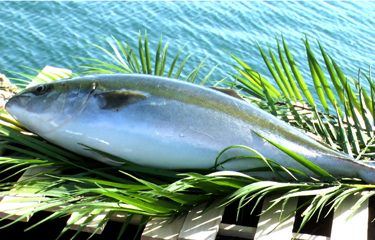Japanese sushi chain Kura Sushi will deploy Umitron Cell automated fish-feeders at all of its aquaculture consignment sites.
The Osaka-based rotary sushi company is vertically integrating into fish farming through a subsidiary, Kura Osakana Farm Co. However, the new subsidiary, established on 1 November, 2021, does not farm fish directly. Instead, it consigns production from existing producers.
In Japan, fishery cooperatives have first dibs on aquaculture sites. The revision of the Fisheries Law, which went into force on 1 December, 2020, allows prefectural governors to grant sites to private companies if they are not fully utilized by the cooperatives. In practice, most companies will try to partner with the co-ops to avoid battling over locations.
In addition to contracting, the new venture aims to introduce artificial intelligence at the production sites. The Umitron Cell smart-feeders introduced are supplied by Tokyo-based Umitron Corporation and utilize AI and Internet of Things (IoT) technology developed by the company. Kura Osakana Farm Co. will lease the equipment to the producers.
In addition to being more efficient, the feeders save labor. Japanese fisheries are facing a labor shortage as the workforce ages, though this is more extreme in the capture fishery than in aquaculture. The average age of fishermen is 56.9 years old, according to the Japanese Fisheries Association. Despite an uptick of those aged 39 or younger, who are primarily getting into aquaculture, the workforce is shrinking.
Another impetus for the use of AI is promotion of sustainability. By using automated feeders, they can reduce fuel use and carbon emissions, by reducing the number of trips from port to aquaculture sites to feed or check the fish. AI also avoids wasted feed by gauging the appetite of fish through feeding behaviors and accurately calculating their size and feed requirements.
Safety and convenience of workers is also promoted, as feeding and monitoring can be done remotely by smartphone input, and there is no need to go out on the sea in rough weather. The hopper of the feeder still needs to be periodically reloaded.
The farm cultivates organic hamachi (Seriola quinqueradiata), which will be sold at the chain’s restaurants.
The Organic Certification Organization (OCO), Inc. established a new standard called "Organic Aquaculture and Processing" based on management standards in Japan and other countries. In March 2021, the certification center established at the Food, Agriculture, Forestry, Fisheries and Information Technology Center (FAMIC) officially certified that OCO's new standard complies with international standards.
Kura Osakana Farm’s “Organic Hamachi” was the first fish to pass this examination and was certified as the first organic fish in Japan that meets international standards. The parent company has worked on the certification project since 2018. The standard included production processes and traceability, feed production, cultivation at fishing grounds, and product processing.
Photo courtesy of Kura Osakana Farm







